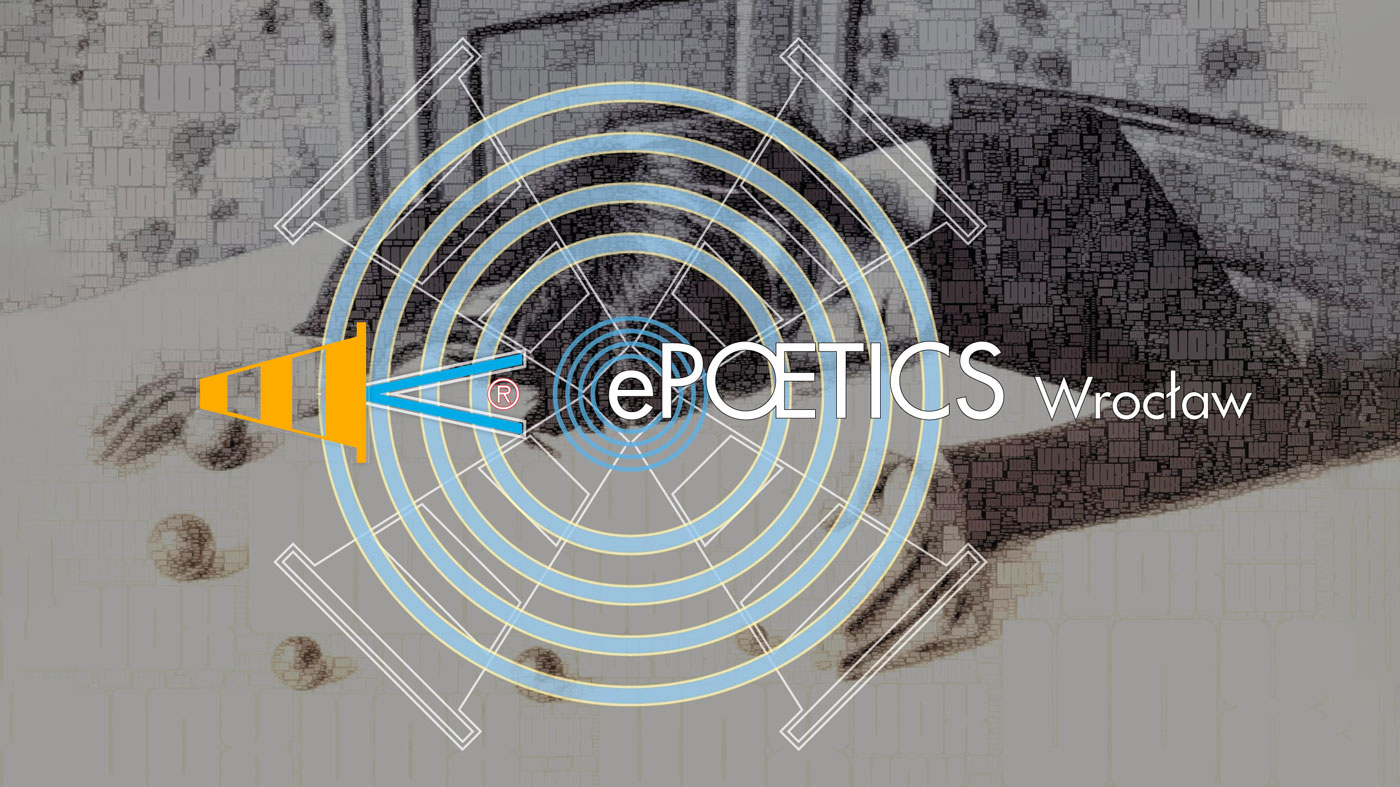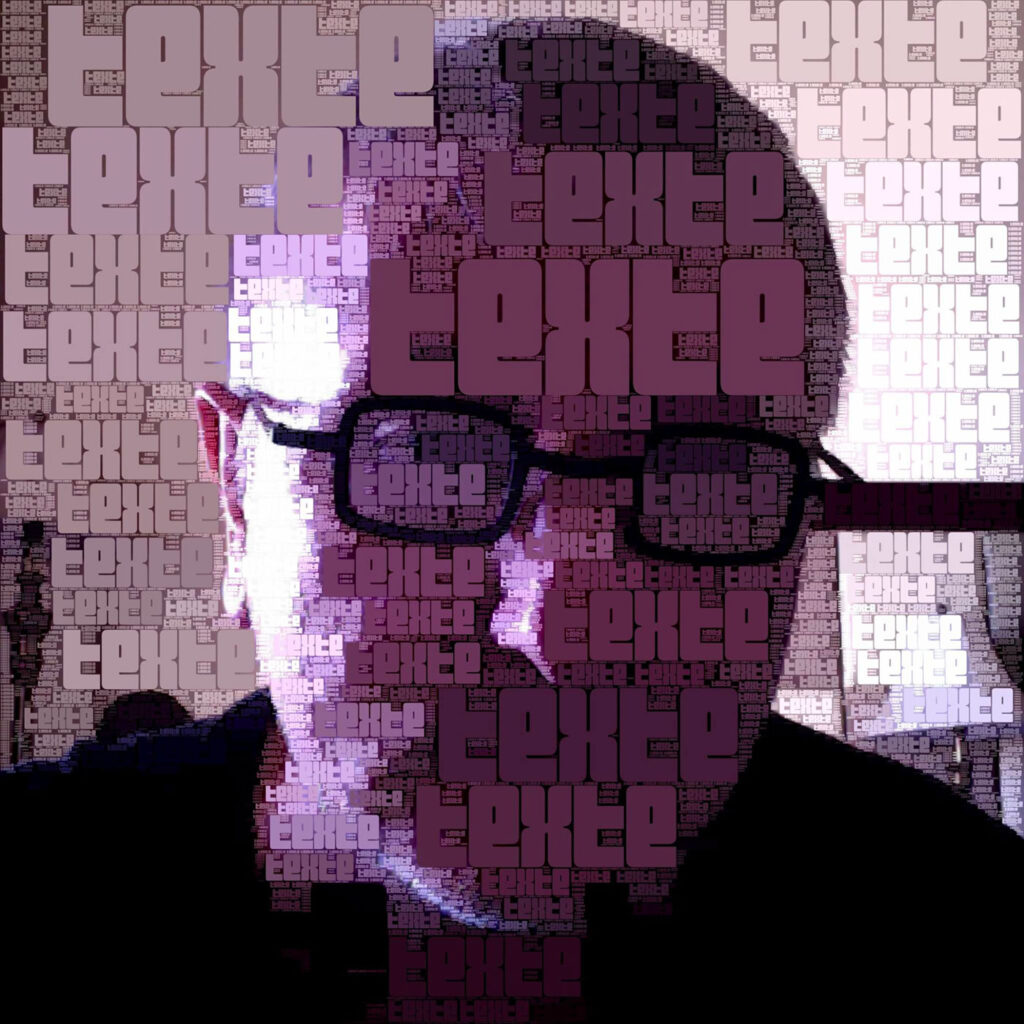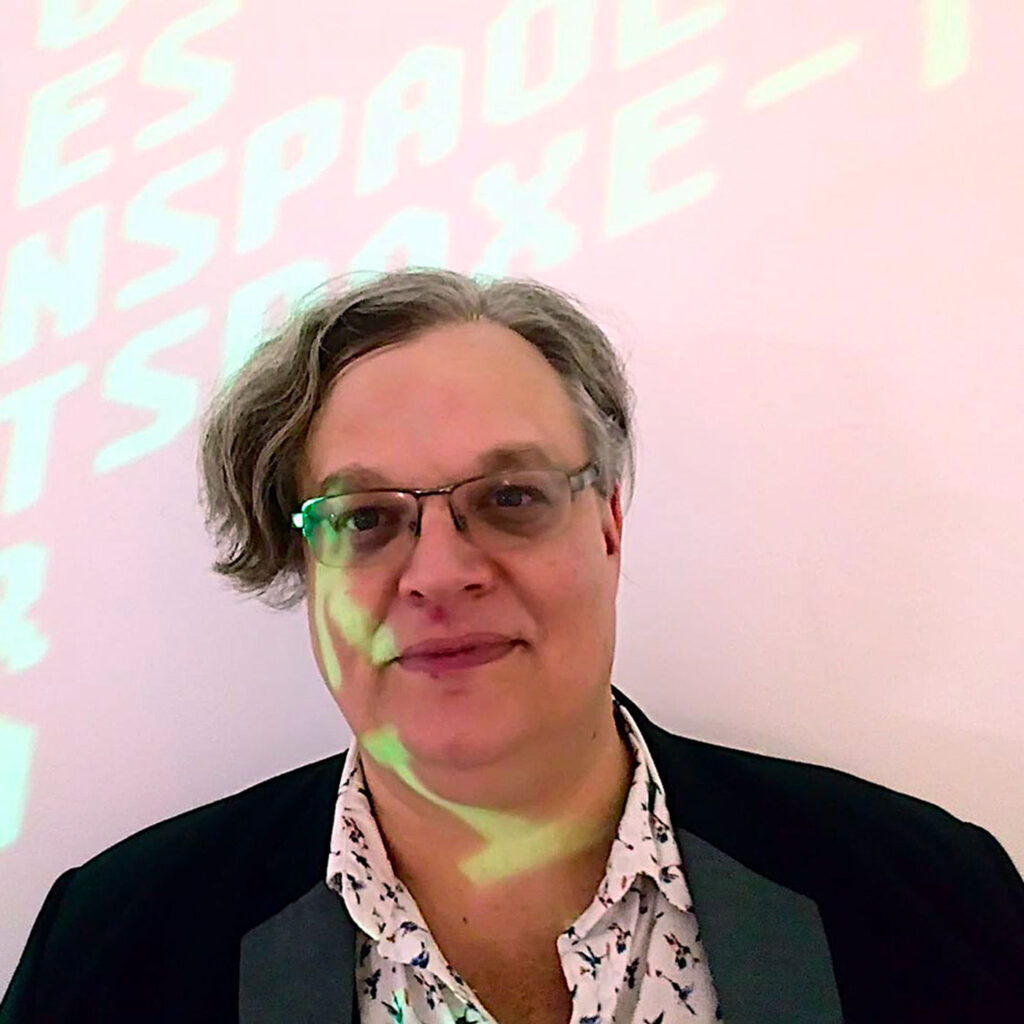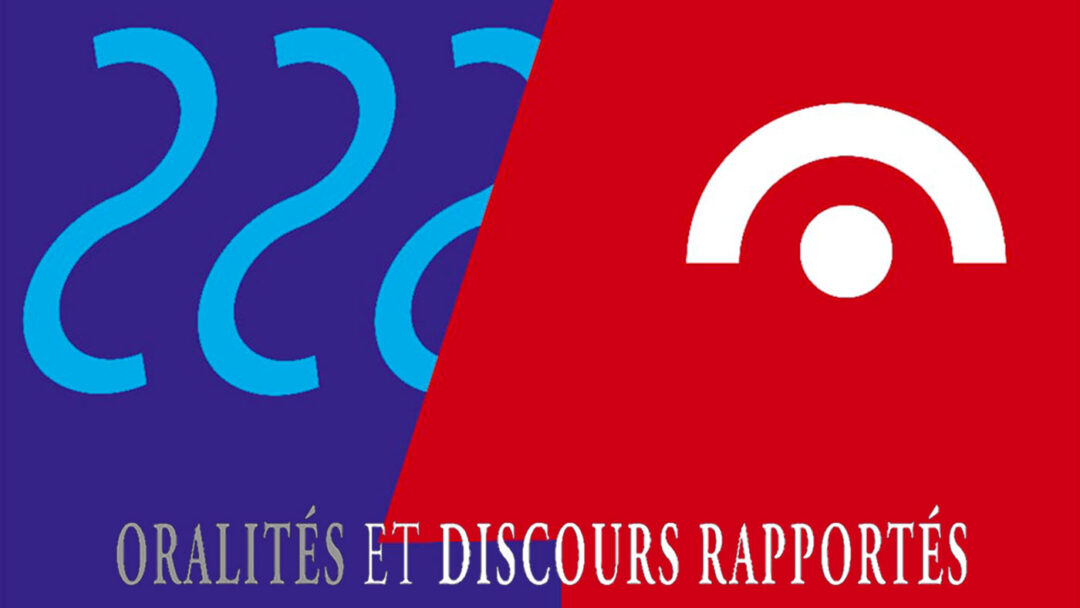Why put orality and reported speech forms at the center of our concerns? Following the “Ci-dit” conferences, which focused particularly on digital genres (more in their scriptural dimension) and on graphic material supports, it seemed important to re-examine the imaginations and forms of contemporary oralities in relation to the circulation and impact of discourses.
Words, audio, voice, expressiveness, accent, tonality, music, intonation, eloquence, sociolect, idiolect, coarseness, verve, and patter: how do all these forms “relate,” and in what contexts? How do they contribute to the visual and auditory dimensions of reported speech?
Talk/performance VoX® e-Poetics@Wroclaw – Philippe Franck + Marc Veyrat (Fr/Be)

From poetic fragments, electro organic soundscapes and anonymous words recorded in situ in the host city/country prior to the international conference and voluntarily integrated into the multimedia device, this hybrid AV performance/conference will try to discover and develop in several theoretical reflections around and from this research – creation device: what are the issues and potentialities around the evolution of theoretical-poetic-sound discourses using digital technologies? What are the particularities of these hybrid writings? What interactions do they have with virtual and augmented reality environments. Which structures these participatory and immersive poetic sensitive maps constantly produce in our necessary hybridizations with the Other and the machine? How the respective constructions of these identities augmented by these immersive encounters with a territory and a specific language are structured and questioned. How the way of hearing, receiving and translating bodily, intentionally or not, consciously or not, sounds, voices, songs, the musical dimensions of words open up and irrigate new fields of research…
By opting for an intermedia hybridity like the practices and discourses it calls upon, the presentation will thus be a game, a new way of meeting an audience based on cards associated with the multiform XR work ‘i-REAL’ (initiated by Marc Veyrat within the Société i Matériel, of which Philippe Franck creates the sound and poetic component) poetic-prospective which will be heard and seen live.
Conception: Marc Veyart (images), Philippe Franck (sounds)/Société i Matériel – Laboratory CiTu – Paragraphe / University Paris 8.
Program - 9th international and interdisciplinary conference (french)
Lundi, le 30 septembre
- 8h30-9h00 – Accueil des conférenciers 9h00-9h45 – Inauguration du Colloque
- 10h00-11h00 Session plénière – Joël July (Université d’Aix-Marseille AMU) – Discours sur discours : qui dialogue dans une chanson ?
- 11h00-12h00 – Session plénière : Alain Rabatel (Université de Lyon) Des mécanismes de l’oralité infraverbalisée et de leur rôle dans les flux associatifs de la parole intérieure
- 14h00-15h30 – PANEL A Chanson, plurivocalisme, multimodalité : CHAUDIER Stephane (Université de Lille)
- De quelles voix sont tissées les chansons? Le paradoxe du plurivocalisme lyrique ; BLAUWART Théo ( Université d’Aix-Marseille AMU et Université de Lille) Des paroles au cœur des paroles : quand le discours rapporté se mêle à la chanson ; VEYRAT Marc, FRANCK Philippe (Université Paris 8) – VoXr e-Poetics
- 14h00-15h30 – PANEL B Oralités en ligne : SIMON Justine (Université de Franche-Comté) – Représentation du discours autre, mèmes et Intelligence artificielle. Quels enjeux et limites pour la communication politique en ligne ? ; EQUOY HUTIN Séverine (Université de Franche Comté) (Dé)couvrir un procès de voix. Le podcast « 13 novembre : trois voix pour un procès » (Charlotte Piret, France Inter) ; JEANNOT-GUERIN Bernard (Université de Lorraine) : Sampling, mixing, acting : circulation et dé-lyres du discours politique dans les scotching français
- 16h00-17h30 – PANEL A Oralités, chant et musique : ARMELLIN Gabriel (Université McGill) – Pour un phrasé jazz en français : traduire l’oralité de Bob Kaufman dans The Ancient Rain ; AKIN Salih (Université de Rouen-Normandie ) – Oralité et discours rapporté dans les chants des dengbêj kurdes ; CAZZETTA Adrien (Université Libre de Bruxelles) – Une mémoire du rap : analyse du discours rapporté des rappeur.euses francophones
- 16h00-17h30 – PANEL B DR, oralité et vocalité : ALBERDI Carmen (Université de Grenade) Marie Cosnay. Polyphonie et cacophonie issues d’un tressage énonciatif ; ILIĆ Igor (Université de Strasbourg) L’oralité du discours représenté : entre unité énonciative et unités prosodiques ; DELORMAS Pascale (Sorbonne Université) Ce que la voix fait entendre. Vocalité dans les productions artistiques et généricité.
Mardi, le 1 octobre
- 9h30-10h30 – Session plénière : Aleksandra Nowakowska (Université Montpellier III) – Par la voix de la tendresse à la (corp)oralité du discours représenté
- 10h30-11h30 – Session plénière – Sophie Marnette (Université d’Oxford) – Les Grammaire(s) du discours rapporté et l’oral représenté en littérature française médiévale
- 14h00-15h30 – PANEL A Oralités, DR et diachronie : DANTAN Emmanuelle (Université Picardie Jules Verne/ Université de Strasbourg) Ventriloquie au féminin dans la lyrique médiévale d’oïl. De quelles voix sont faits les personnages féminins des chansons de trouvères ? ; HOUARA Amina (Universite de Lille) Défiger le récit encadré : les chaînes en et + que dans les devis facétieux de la Première Modernité ; RODRIGUEZ SOMOLINOS, Amalia (Universidad Complutense de Madrid) L’évolution des parenthétiques évidentiels à ce qu’il paraît, il paraît, paraît, paraît-il.
- 14h00-15h30 – PANEL B Oralités et traduction : TAIVALKOSKI-SHILOV Kristiina (Université de Turku) – Écologie, DR et traduction : Le cygne chanteur d’Yrjö Kokko en français ; PAWŁOWSKA Maja (Uniwersytet Wrocławski)… La vieille chanson” de la deuxième scène du premier acte du Misanthrope et ses trois traductions polonaises (Szymanowski, Boy-Żeleński, Radziwiłowicz)
- 16h00-17h30 – PANEL A Formes du DR et encodage de l’oralité : BIKIALO Stéphane (Université de Poitiers) Quelles formes de RDA pour la fidélité ? ; RA YMOND Laurie (Université Savoie Mont-Blanc), Grammatisation du ouï-dire : la mise à l’écrit de l’oral dans les Archives de l’affaire du Chevalier de La Barre (1765-1766) ; JAKUBOWSKA Joanna (Université de Wrocław) Les voix des femmes dans « Isabelle » d’André Gide
- 16h00-17h30 – PPANEL B Oralités, DR et engagement politique et social : PACHOCINSKA Elżbieta (Uniwersytet Warszawski) La voix des militants écologistes dans l’espace publique. ; ROUBACHE Izzeddine (Université de Ghardaïa) Le DR (discours rapporté) : une « arme argumentative » pour les journalistes de la presse algérienne lors du printemps du monde arabe ?
- 18h00-19h30 – PANEL A Oralités et collectivité : TOURNEMIRE Gabrielle (UniversitedePoitiers)Fairedes voix un chœur : retranscriptions de la parole collective dans la littérature contemporaine ; KOST Hanna (Université nationale Ivan Franko de Lviv) – La construction cognitive du discours à travers le chant : réflexions sur les modalités interprétatives (le cas de la chanson «Враже»/ « Eh ennemi… ») ; ROUYETT Salma (Université Mohammed V Rabat) – Femmes qui chantent, femmes chantées dans l’art marocain de l’Aït
- 18h00-19h30 – PANEL B Oralités et engagement politique et social : JAWORSKA-KASKA Alicja (Uniwersytet Warszawski) Le débat autour de l’écriture inclusive. Comment les différentes voix sont représentées dans le discours public ; LEWI Olivia (Sorbonne Université) Résonance et discours rapportés dans Janvier 2015- Le procès de Yannick Haenel : DRESCHER Martina (Université de Bayreuth) Rumeurs, discours rapporté et marquage évidentiel. L’exemple du discours pandémique camerounais.
Mercredi, le 2 octobre
- 9h30-11h00 – PANEL A DR, genres de discours et encodage de l’oralité : LACAZE Grégoire(Université d’Aix-Marseille AMU) La variation diamésique à l’œuvre dans les énoncés de discours direct : mise en rapport de voix dans la fiction, la presse et les RSN ; MORICHEAU-AIRAUD Bérengère (Université de Pau et des Pays de l’Adour ) L’oralité dans les discours représentés au sein des récits de transfuges de classe ; BONGARD Quentin (Université Libre de Bruxelles), Le fragnol de l’idiolecte de Montse dans le roman « Pas pleurer » de Lydie Salvayre
- 9h30-11h00 – PANEL B Oralités, DR, genres discursifs et comparaison : KOMUR-THILLOY Greta (Université de Haute Alsace) Le rôle des témoignages dans la construction du discours sur la seconde guerre mondiale dans des manuels scolaires d’histoire : une perspective comparative ; AUFRA Y Antoine (Université de Strasbourg) La représentation de discours dans deux genres narratifs oraux en allemand et en français ; BIARDZKA Elżbieta, P ASKART Patrycja, RĘBKOWSKA Agata (Université de Wrocław) Les oralités dans le discours des manuels d’histoire français et polonais
- 11h30-12h15 – TABLE RONDE : Juan Manuel López-Muñoz (Université de Cadix) Sophie Marnette (Université d’Oxford) Laurence Rosier (Université Libre de Bruxelles) – De quelles voix sommes-nous fait.es ? Oralités et discours rapportés Histoire, formes et pratiques
Marc Veyrat (Fr)
 Artist, Aggregated Professor, HDR Senior Lecturer in Art Sciences; Head of the Hypermedia Communication Department at the University Savoie Mont-Blanc, and researcher at the CiTu Paragraphe Laboratory at the University Paris 8; Associate Researcher at the UNESCO / ITEN Chair (Innovation, Transmission, Digital Edition).
Artist, Aggregated Professor, HDR Senior Lecturer in Art Sciences; Head of the Hypermedia Communication Department at the University Savoie Mont-Blanc, and researcher at the CiTu Paragraphe Laboratory at the University Paris 8; Associate Researcher at the UNESCO / ITEN Chair (Innovation, Transmission, Digital Edition).
Marc Veyrat is interested in the complexity of information shaping - in digital, visual and contemporary art - networking, and communication strategies, particularly in Mixed Reality (XR) devices and across social networks or the web.
In 2000, he initiated La Société i Matériel, a collaborative hypermedia project using information in different artistic dimensions (pictorial, textual, sound, etc.), which produced i-REAL, an XR project (5 VR worlds to date) presented at numerous international events and festivals. He has written numerous articles and directed publications (including 100 notions for Digital Art, La Société i Matériel - De l'information comme matériel artistique - volume 1, Never Mind - De l'information comme matériel artistique - volume 2 - all published by L'Harmattan in 2015).
Philippe Franck (Fr/Be)
 Under the name Paradise Now, Philippe Franck has been developing, since the early 1990s, a multifaceted artistic journey in a forward-looking and willingly collaborative approach. He has produced numerous choreographic music, exhibitions, performances interdisciplinary, videos (notably for Régis Cotentin, Hanzel & Gretzel and Thomas Israel), multimedia devices (with digital artists, Philippe Boisnard, Marc Veyrat, art2network).
Under the name Paradise Now, Philippe Franck has been developing, since the early 1990s, a multifaceted artistic journey in a forward-looking and willingly collaborative approach. He has produced numerous choreographic music, exhibitions, performances interdisciplinary, videos (notably for Régis Cotentin, Hanzel & Gretzel and Thomas Israel), multimedia devices (with digital artists, Philippe Boisnard, Marc Veyrat, art2network).
In addition to its collaborations with the holistic performer Isa*Belle (several installations and body/sound performances since 2005), Paradise Now also works with musicians electronics Christophe Bailleau (the duo Pastoral), Gauthier Keyaerts (within Supernova), Stephan Dunkelman, Christian Leroy, Didié Nietzsche, the vocalist/performer Maja Jantar as well as several poets (including Ira Cohen, Gerard Malanga, Werner Moron, Eric Therer, Catrine Godin, Habiba Sheikh…).
His recording productions can be found notably on the Transonic, Optical Sound and Sub Rosa labels
Infos
- 30.09 > 02.10.2024
- Institute of Romance Studies of the University of Wrocław
- plac Nankiera 4, 50-146 Wrocław, Pologne
- groupe-cidit.com
Production
- Institute of Romance Studies, University of Wrocław, Poland
- In cooperation with the University of Warsaw, the Interdisciplinary Research Center, University of Wrocław & Adam Mickiewicz University and the University of Lviv
- The VoX® e-Poetics project is a production: Société i Matériel – Laboratoire CiTu – Paragraphe / Université Paris 8 with the support of Transcultures and the European Pepinieres of Creation

